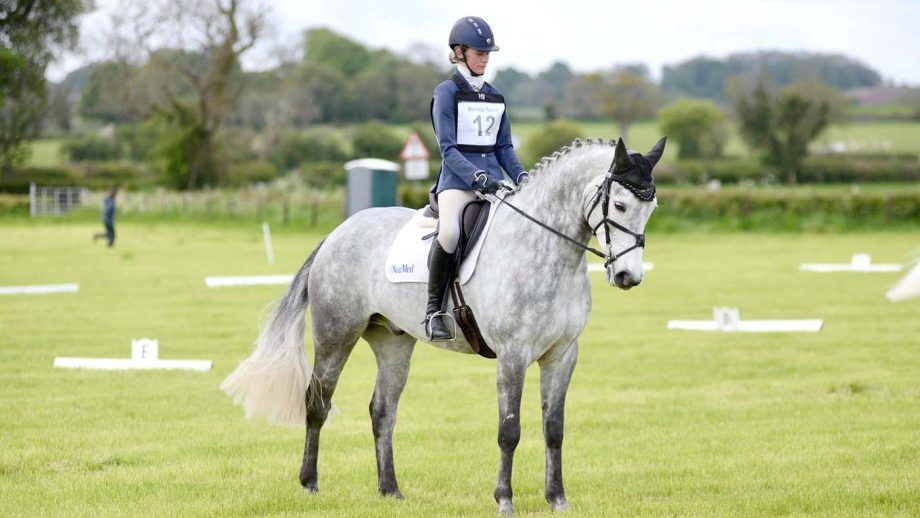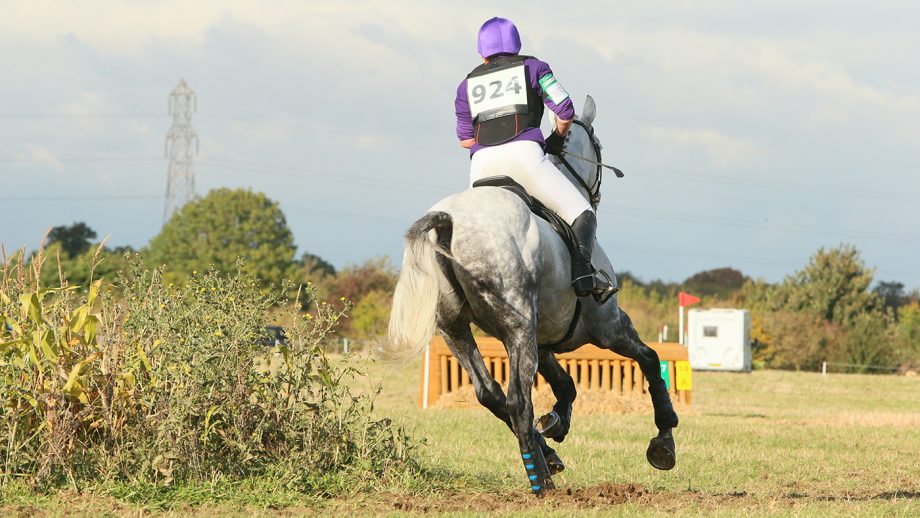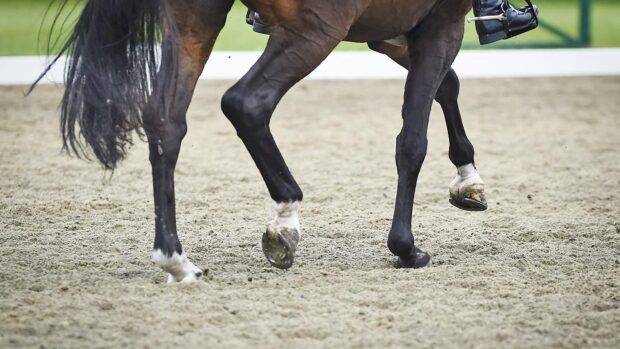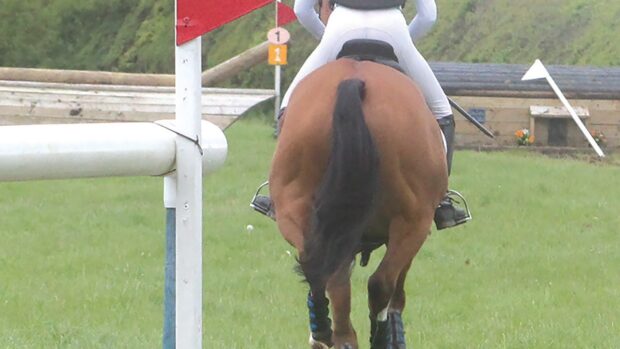More riders are having to make the choice between competing or training – while some events are being forced to cancel, as the cost of living takes hold of the equestrian competition season.
Concerns have been shared across the board as costs continue to rise, which are being met by reports of low entries, event cancellations, and riders having to make difficult choices on what to spend their money on. H&H has spoken to people from across the industry about the impact.
Herefordshire-based amateur rider Verity Daughtrey, who events and showjumps, told H&H increased fuel costs mean she is having to compete less and alternate which of her two horses she takes out.
“Recently I went for a cross-country training session, and the 120-mile round trip cost me more than £80 in fuel,” she said. “When I compete I want to do well so I have to pay for more training, so it’s a case of spending every penny that I can on lessons then maybe having one trip out a month. At the moment I’m trying to stick to fairly local competitions to keep fuel costs down.
“I was a British Eventing (BE) member for six years but when my membership was up for renewal in August I looked at it and thought, ‘I can’t afford to renew this and the money is needed elsewhere.’ Another thing was the abandonment insurance; while I know some events are doing their own, I can’t possibly pay more than £100 for an event that might get abandoned and I don’t get a penny back.”
Research by the Institute for Government said the “cost of living crisis” refers to the fall in “real income” that the UK has experienced since late 2021, and is caused by a combination of high inflation outstripping wage increases and upcoming tax increases that have squeezed incomes for many households. The report adds that the crisis is “expected to worsen” when planned tax increases come in from this month.
Fuel and energy costs have risen significantly this year. According to the AA, in March the average UK fuel costs were 163.8p for petrol and 173.8p for diesel. In March 2021, the average cost was 125.3p per litre for unleaded petrol and 128.2p for diesel.
The energy price cap increased on 1 April, and Ofgem reported customers on default tariffs paying by direct debit would see an increase of £693 per year. Changes to National Insurance rates were also brought this month, with contributions increasing by 1.25%.
British Horse Society (BHS) accredited professional coach Claire Light told H&H she has noticed more riders are having to choose between competing and having lessons, and this is having an impact on her own competition plans.
“Normally I would event but I’m having to look to the future and think, ‘Do I compete next month, or keep that money in the bank just in case?’” she said.
“I don’t necessarily think we will see a massive hit this summer with it being the first real summer after Covid, but when September comes and people are putting their heating back on I think we’ll notice a big crash across the equestrian industry.”
In BE, a pattern of riders holding off on entering until after the ballot date has been reported, and some events have been forced to cancel owing to entry numbers. Swalcliffe Park (1) (19–20 March) cancelled as entries were “significantly” short at ballot date and organisers were unable to take the “gamble” to see if entries came in. Bovington (1) (15–16 April) cancelled as wet weather had made course preparation difficult combined with “poor” entry levels at its ballot date, and Broadway (1) (7–8 May) has cancelled owing to a lack of entries.
BE chief executive Helen West told H&H there is “no doubt that members are more mindful of costs”.
“Members are understandably hanging on to their money for longer, so we are seeing a pattern of entries coming in later which undoubtedly causes challenges for organisers. That said, the events that have run so far have, in the main, been well supported,” she said.
Great Witchingham (1) (25–26 March) dropped to two days of competition instead of its scheduled three, owing to low entries. The event’s organiser Robert Sayer told H&H they received 411 entries, compared to 710 in 2020, before it was cancelled by the Covid lockdown.
“There are various driving factors; we are a peripheral event in Norfolk – and there’s been a declining BE membership in the east of England – the increase in costs of entries and the lack of abandonment insurance, ” he said.
“When it got to our ballot date the price of fuel rocketed courtesy of what is going on in Ukraine and the cost of filling up your lorry went up by 20-30% literally overnight. It became very expensive to get to a peripheral event running national classes. Competitors don’t really vote with their seat, they vote with their pocket.”
Jenny Meiklejohn of Musketeer Events, which organises fixtures including Cirencester Park, Burnham Market and Cholmondeley Castle, told H&H she believes the increase in living costs is affecting grassroots riders more than professional or elite. Cirencester Park added an extra day to its first fixture, which had classes up to advanced intermediate (26–28 March), and its second fixture, which includes international sections (30 April–1 May), currently has a waitlist.
“At Burnham Market (14–16 April) we had a really light day on the first day – we were probably 100 entries down at the lower end. But on the flip side we had nearly 200 advanced horses across the four-star and advanced classes. There are definitely issues at the grassroots end and we will no doubtedly see that when we open entries for Burnham (2) or Cholmondeley,” she said.
“We also run a series of unaffiliated events so it will be interesting to see how that market reacts and whether it is as affected.”
Discussing the wider impact, Ms Meiklejohn said she believes the struggle to find volunteers will be “exacerbated” by rising fuel costs, but said the problem in finding volunteers is “not a new one”.
“As much as we completely rely on volunteers, I believe as a sport we should be looking at how we can adapt and move in ways that other countries have, for example events in the US don’t have three fence judges at every jump. We should be looking at the positioning of volunteers and things like making more use of cameras.”
The impact is also being felt in the other disciplines. Zara Pawley, a British Dressage (BD), showing and FEI eventing judge, told H&H she will be doing less judging this year owing to rising costs.
“I pay a full BD membership whether I judge or not, to stay on the list. I have to pay for my own training and if a convention is further away then I have my accommodation overnight,” she said.
“For BD judging I get 45p mileage, but there isn’t a set mileage for showing. I live in Norfolk and a tank of diesel is now costing me nearly £80 and I just can’t afford to do it – and I’m not the only judge feeling like this.”
BD chief executive Jason Brautigam told H&H the organisation is “very mindful” how the rise in the cost of living will “inevitably have an impact” on the dressage community.
“Not just competitors, but our organisers, venues, officials and volunteers too. This is on the agenda for further discussion at our finance and business development committee and board meetings this month, to consider how we can best support all of our stakeholder groups and ensure that the sport remains financially viable.
“We currently have record numbers of members and horses competing with BD, with 18,350 active members at the end of March, resulting in higher than forecast starters in each of the first three months this year. However, there is no room for complacency, especially with the impact of inflation, fuel costs and National Insurance rises not fully hitting until April onwards, so we are continuing to monitor the situation closely.”
British Showjumping (BS) chief executive Iain Graham told H&H multi-day shows continue to be well supported, with the Blue Chip championships and the Pony of the Year Show this month receiving good entries. BS has kept its affiliation fees for centres the same since 2010 in an effort to help centres with costs.
“I think people are looking to minimise mileage by attending a show for three or four days,” he said.
“But if fuel prices stay at current levels the peripheral venues and single-day shows will probably notice people travelling a bit less and if this continues for an extended period of time into years I’m sure it will have an impact on people’s ability to spend money on their hobbies.”
Jane Gregory, manager of Chard Equestrian, which runs British Showjumping and BD, told H&H shows have been well supported, but competitors are trying to save money where they can.
“This week we have people competing on Wednesday evening, and they are staying on for our weekend show to save on fuel costs rather than making two trips,” she said.
You might also be interested in:

Handy tips to help you save money on your competition membership

How ‘eyes on the ground’ can help with your training and save you money

Subscribe to Horse & Hound magazine today – and enjoy unlimited website access all year round
Horse & Hound magazine, out every Thursday, is packed with all the latest news and reports, as well as interviews, specials, nostalgia, vet and training advice. Find how you can enjoy the magazine delivered to your door every week, plus options to upgrade your subscription to access our online service that brings you breaking news and reports as well as other benefits.




